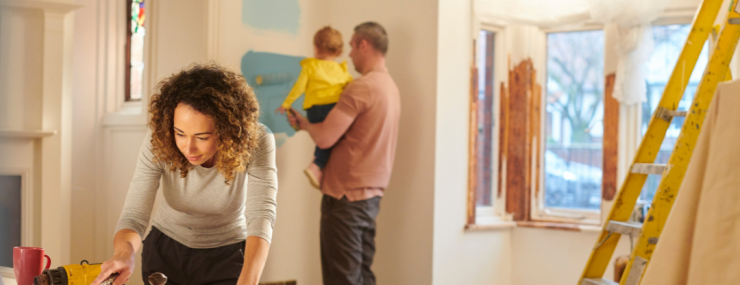
Thinking about buying a fixer-upper? The idea can be tempting — a lower purchase price, the chance to create your dream home, and the potential for quick equity gains.
But before you jump in, it’s important to look beyond the excitement of renovation shows and fully understand the real costs — both financial and emotional — of taking on a home in need of significant work.
This guide breaks down what you should know before buying a fixer-upper, the hidden costs that can catch buyers off guard, and how to decide if it’s the right choice for you.
What Is a Fixer-Upper?
A fixer-upper is a property that needs repairs, updates, or even major renovations before it’s fully livable or up to your desired standards.
These homes can range from slightly outdated (think worn flooring or dated kitchens) to those requiring extensive structural work.
While they’re often priced lower than similar move-in-ready homes in the same neighborhood, the lower listing price doesn’t always mean a lower overall investment.
The Pros of Buying a Fixer-Upper
Before diving into the potential downsides, here’s why buyers often consider fixer-uppers:
- Lower Purchase Price – Pay less upfront compared to turnkey homes.
- Customization Opportunities – Design the home to match your taste and lifestyle.
- Potential for Equity – Renovations can significantly boost the home’s value.
- Less Competition – Many buyers avoid projects, giving you an edge in negotiations.
If you have the time, patience, and vision, buying a fixer-upper can be a highly rewarding experience.
The True Costs of a Fixer-Upper
While the initial price tag might look appealing, here are the hidden costs you need to factor in:
1. Renovation and Repair Expenses
Renovations can range from cosmetic updates to full-scale structural repairs.
Approximate costs:
- Cosmetic updates: $5,000–$20,000
- Kitchen remodel: $15,000–$50,000+
- Bathroom remodel: $10,000–$30,000
- Major structural repairs: $20,000–$100,000+
Tip: Always get a professional inspection and contractor estimates before you buy.
2. Permits and Code Compliance
Older homes may require permits and upgrades to meet current codes:
- Licensed contractor requirements
- Permit fees (vary by location)
- Inspection scheduling and potential delays
Skipping permits may seem faster, but it can cause big problems when you sell.
3. Temporary Housing or Limited Use
If the home isn’t livable during renovations, you may need to:
- Rent temporary housing
- Live with dust, noise, and limited access to parts of the home
4. Financing Challenges
Homes in poor condition may not qualify for a standard mortgage. You might need:
- FHA 203(k) loan
- Fannie Mae HomeStyle Renovation loan
These can be more complex than standard financing.
5. Time and Stress
The emotional cost is real. Expect:
- Project delays
- Budget overruns
- Unforeseen issues like mold or faulty wiring
How to Evaluate If a Fixer-Upper Is Worth It
1. Get a Detailed Home Inspection
Identify:
- Structural integrity
- Plumbing and electrical condition
- Roof and foundation health
- Potential hazards like asbestos or lead paint
2. Research Renovation Costs in Your Area
Get multiple quotes and add a 10–20% contingency budget for surprises.
3. Compare the After-Repair Value (ARV)
Ask:
- Will the finished home be worth more than you’ve invested?
- Does the neighborhood’s price ceiling limit your potential profit?
4. Be Honest About Your Skills and Time
- Are you ready to DIY or will you rely fully on contractors?
- Can you manage the stress of an ongoing renovation?
When a Fixer-Upper Makes Sense
Buying one might be smart if:
- You want into a specific neighborhood but can’t afford turnkey homes.
- You’re willing to live through renovations for potential equity.
- You have extra funds set aside for repairs.
- You enjoy hands-on home projects.
When to Avoid a Fixer-Upper
It may not be the best choice if:
- You’re on a tight move-in timeline.
- You don’t have extra savings for unexpected repairs.
- The property has major structural issues beyond your budget.
- Renovation stress isn’t for you.
Final Thoughts
A fixer-upper can be a smart investment and a fulfilling project — but only if you go in fully prepared. Lower purchase prices don’t always mean savings after you add in renovations, permits, temporary housing, and time spent managing the process.
Do your homework:
- Get a thorough inspection
- Research local renovation costs
- Consider the after-repair value
- Be realistic about your capacity and budget
If you’re ready for the challenge, your dream home might just be hidden beneath a little hard work. But if you value a hassle-free move, a turnkey home might be worth the extra investment.
Thinking about buying — whether it’s a fixer-upper or move-in-ready?
The Johnson Team Real Estate at The Muljat Group can help you weigh the pros and cons, connect you with trusted contractors, and find the perfect fit for your lifestyle and budget.
📞 Call us at 360-303-2734
📧 Email info@johnsonteamrealestate.com
